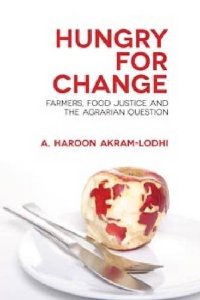Voices of Peasant Farmers from the Margins of the Global Food Crisis
DOI:
https://doi.org/10.5304/jafscd.2014.043.003
Keywords:
Aagrarian Question, Food JusticeAbstract
First paragraphs:
Haroon Akram-Lodhi's Hungry for Change: Farmers, Food Justice and the Agrarian Question adds to the growing literature on food sovereignty and social movements from around the globe. The books Food Sovereignty in Canada: Creating Just and Sustainable Food Systems (2011) and Food Sovereignty: Reconnecting Food, Nature and Community (2010), written by scholars and agrarian activists and edited by Hannah Wittman, Annette Aurelie Desmarais, and Nettie Wiebe, detail the origins of food sovereignty and analyze food regimes and food crises. The authors outline agrarian reforms from historical and contemporary perspectives and explain the relationships between food systems, energy, climate change, environment, and food regime restructuring. Through an examination of socio-economic and environmental consequences of the food system, the authors provide examples of peasant movements that are transforming relationships between food, markets, and local and global communities. Other recent books include Food Regimes and Agrarian Questions by Philip McMichael (2013), Class Dynamics of Agrarian Change by Henry Bernstein (2010), and Peasants and the Art of Farming: A Chayanovian Manifesto by Jan Douwe van der Ploeg (2013). These scholars focus on the structure and dynamics of peasant farms, production and labor, and consistent marginalization of peasants as result of liberalization and globalization. Such books as Food for Thought: A Multidisciplinary Discussion by Robert Stewart and Susan Korol (2012) and Food for Change: The Politics and Values of Social Movements by Jeff Pratt and Pete Luetchford (2013) seek to address food production, distribution, and food choices people make in order to show how important alternative food movements are in creating an economic system within which individuals know where, how, and by whom their food is produced.
These influential authors address food sovereignty issues from a systemic perspective to help their readers understand the complex relationships between agriculture, market, laws, and environment and their influences on each other both locally and on a global scale. Building on these and other books, Akram-Lodhi’s Hungry for Change puts a human face on agricultural development by examining the socio-economic transformations in individual peasant farmers’ lives and the lives of their families as a segment of a bigger global picture. Akram-Lodhi’s approach is especially useful as an introduction for readers who wish to understand the devastating effects of the global food regimes on the lives of individuals, especially in the global South. Through personal accounts of peasant farmers, the author fills a niche in the literature by examining the process by which the world food system has become a capitalist enterprise in the hands of power holders, corporations, the IMF and World Bank, and privileged consumers in the North....
Metrics

Downloads
Published
How to Cite
Issue
Section
Categories
License
Copyright (c) 2014 Breann Maxwell, Zulfiya Tursunova

This work is licensed under a Creative Commons Attribution 4.0 International License.
The copyright to all content published in JAFSCD belongs to the author(s). It is licensed as CC BY 4.0. This license determines how you may reprint, copy, distribute, or otherwise share JAFSCD content.











